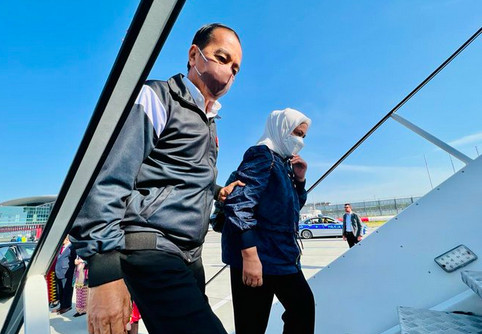Popular Reads
Top Results
Can't find what you're looking for?
View all search resultsPopular Reads
Top Results
Can't find what you're looking for?
View all search resultsInclusive diplomacy: The First Lady on a courageous mission
Diplomatic spouses have actually contributed to the success of diplomacy through various activities, ranging from the private to public fora, from an informal to formal capacity.
Change text size
Gift Premium Articles
to Anyone
P
resident Joko “Jokowi” Widodo has just returned from a peace-building visit to two warring countries, Ukraine and Russia. It was said to be successful and with a significant impact on Indonesia’s Group of 20 (G20) presidency.
Among the many aspects of the highly applauded shuttle diplomacy, the presence of First Lady Iriana accompanying the President was widely noted not only by the Indonesian people but also netizens across the world. This was evident when a picture Jokowi posted of Iriana warmly hugging a patient at a Ukrainian hospital for war victims received thousands of likes and retweets.
In its editorial "Courageous mission" on July 2, for example, The Jakarta Post wrote that "Commendation also goes to First Lady Iriana who stoically stood by the President, accompanying him on the trip to what is currently the most dangerous war zone in the world".
A political communications expert, when asked about the significance of Iriana's involvement despite the grave danger, said this indicated Indonesia’s unwavering commitment to world peace as mandated by the Constitution. In the Ukrainian and Russian outing, the First Lady showcased Indonesian inclusive diplomacy.
From a global perspective, this inclusive diplomacy was momentous. Only a few days earlier, the United Nations General Assembly (UNGA) adopted a resolution inaugurating the International Day of Women in Diplomacy to be commemorated on June 24 every year. The basis of Resolution 76/269 was “reaffirming the 2030 Agenda of Sustainable Development and that gender equality and empowerment of all women and girls will make a crucial contribution; recognizing the important contributions that women make to diplomacy and noting the underrepresentation of women in diplomacy”.
Mainstream diplomacy is the sphere of official diplomats under the Foreign Ministry as official representation of the state. Hence in the case of UNGA Resolution 76/269, the main subject concerning the resolution is female diplomats.
However, it should be noted that in recent decades the world has transformed completely. Globalization and massive progress in information technology have altered the landscape of almost all fields, including diplomacy. State actors now are no longer the only players; non-state actors in various forms have continuously contributed to the field. Even individuals can take part through the so-called “citizen diplomacy” in quite many ways.
From an academic point of view, the inclusiveness of women in diplomacy, and international relations in general, has been a widely discussed topic, especially after the launch of Chyntia Enloe’s book, Bananas, Beaches and Bases: Making Feminist Sense of International Politics. In the book, dubbed a bible for feminist international relations scholars, Enloe reveals how important global events are greatly influenced by the role of ordinary women, including female textile workers, international bankers as well as diplomatic spouses, among other positions.
Academic discourse indicates that the diplomatic spouse community (previously dominated by women due to the domination of male diplomats) was found to be “underdiscussed and underrepresented”, while women actually contribute to the success of diplomacy through various activities, ranging from the private to public fora, from an informal to formal capacity while representing their countries abroad.
Their multiple roles as wives, mothers, members of society and representatives of their countries can stretch to unexpected, dangerous positions when accompanying diplomats assigned to hazardous posts, just like for Ibu Iriana recently.
The list can still go further, as women outside official diplomatic channels contribute to diplomatic outcomes.
Biltekin, another international relations scholar, for example, writes about Swedish women residing in the United States who contribute to cultural diplomacy by engaging in activities that relate to their country of origin. She calls them “unofficial ambassadors” whose agency and roles “reinforce notions about feminine spheres of action within international relations”.
In fact, we can easily find this kind of phenomenon in many corners of the world where Indonesian women diaspora live and actively promote Indonesian culture to local people.
The phrase “one for all and all for one” is indeed applicable to the interconnectedness of our world nowadays, including the impact that a domestic situation can have on diplomatic outcomes. The act of even one single individual can lift or ruin a country's image as a whole.
Therefore diplomatic efforts abroad, derived from foreign policy, will have to be supported domestically, hence each and every one of us, woman or man, matters.
***
The writer is a doctoral student at the Department of International Relations, Padjadjaran University, Bandung, the author of the memoirs Paris, C’est Ma Vie and Voilà La France, coauthor of anthology Di Balik Gerbang: Inspirasi dari Kisah 7 Pendamping Diplomat (Behind the Gate: Inspiration from the Tales of 7 Diplomatic Spouses) and the spouse of an Indonesian diplomat.










